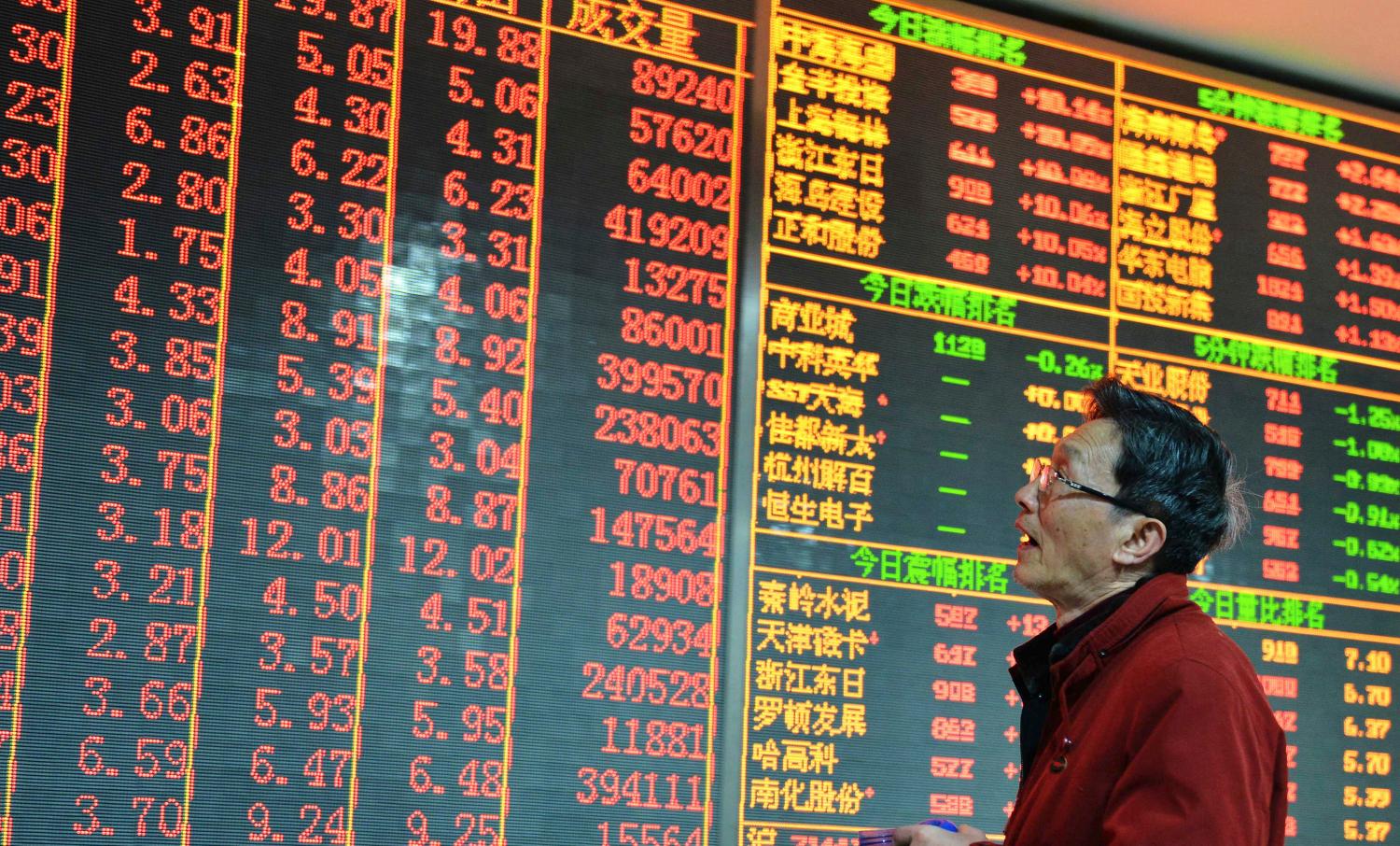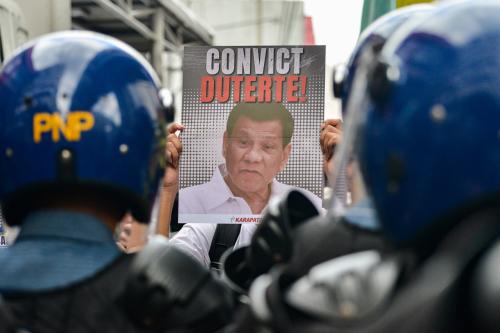Several serious problems in China could trigger a major crisis, potentially igniting either a domestic revolution or foreign war. Cheng Li wrote this memorandum to President Obama as part of Big Bets and Black Swans: A Presidential Briefing Book.
- What challenges does the Chinese Communist Party face?
- What does the Chinese Politburo need to do about these challenges?
- How can the United States prevent any Asian states from engaging in the use of force?
Download Memorandum
(pdf) |
Download the Presidential Briefing Book
(pdf)
TO: President Obama
FROM: Cheng Li
China poses a major policy challenge to the United States largely because of the unpredictable trajectory of both its domestic transformation and foreign relations. While there has been much attention paid to China’s rapid economic rise and growing international clout, two other scenarios have been overlooked: domestic revolution and foreign war. There are many serious problems in China that could trigger a major crisis, including slowing economic growth, widespread social unrest, rampant official corruption, vicious elite infighting, and heightened Chinese nationalism in the wake of escalated tensions over territorial disputes with Japan and some Southeast Asian countries. This suggests that your administration should not easily dismiss the possibility that revolution or war might occur. Either event would be very disruptive, severely impairing global economic development and regional security in the Asia-Pacific; a combination of the two would constitute one of the most complicated foreign policy problems of your second term.
Recommendation:
The best way to prepare in advance for either likelihood is for this White House to cultivate a deeper relationship with Xi Jinping and his new leadership team, maximizing cooperation in various areas. In establishing a constructive relationship with the new Chinese leadership, the United States should be fully aware not only of the daunting challenges that Xi and the Chinese Communist Party (CCP) confront on both domestic and international fronts, but also the uncertain nature of Xi’s policy trajectory and of Chinese public opinion about the new Party boss.
There are two particularly undesirable outcomes. One is a situation in which the vast majority of the Chinese public becomes both anti-CCP leadership and anti-American. The other is a situation in which Xi derives his popularity from a strong endorsement of Chinese militarism.
To avert the first you should, while engaging with the Chinese leadership, more explicitly articulate to the Chinese people both the longstanding goodwill that the United States has towards China and America’s firm commitment to democracy, human rights, media freedom, and the rule of law, which the United States believes are fundamental to the long-term stability of any country.
To decrease the likelihood of the second — a conflict in the region that could involve the United States directly — you should more consistently exert American influence on U.S. allies or partners (including China) in the Asia-Pacific region to prevent the use of force by any party. Simultaneously, promoting military-to-military ties with the new PLA leadership should be a top priority.
Background:
China in Revolution: Anti-CCP, Anti-America
The scenario of abrupt bottom-up revolution occurring in China has recently generated much debate within that country. One of the most popular books in elite circles today is the Chinese translation of Alexis de Tocqueville’s 1856 classic The Old Regime and the Revolution. Senior leaders of the CCP (most noticeably Premier-designate Li Keqiang and new member of the Politburo Standing Committee Wang Qishan) were reported to have strongly recommended that officials read the book. In speeches given after becoming Party General Secretary, Xi warned that the Party could collapse if the leadership failed to seize the opportunity to reform and improve governance.
The fear and anxiety on the part of the CCP leadership seem well grounded given the daunting challenges the Party confronts:
• China’s GDP growth target of 7.5 percent for 2012 was the lowest since 1990 (in the aftermath of the Tiananmen incident). This downturn is not only the result of flagging exports in the wake of the Eurozone crisis, but also the country’s own political bottlenecks. This slowdown will, in turn, further reveal flaws in the Chinese authoritarian system and thus could become a trigger for political crises.
• Economic inequality is increasing substantially. The Gini coefficient rose to 0.47 in 2009 and then to 0.61 in 2010, far exceeding the 0.44 threshold generally thought to indicate potential for social destabilization.
• China’s official data reveal that there are roughly 180,000 mass protests annually, or about 500 incidents per day. According to the Chinese official media, these protests have become increasingly violent in recent years, especially in ethnic minority regions.
• Corruption is out of control. The latest report by Washington-based Global Financial Integrity (GFI) shows that cumulative illicit financial flows from China (primarily by corrupt officials) totaled a massive $3.8 trillion from 2000 to 2011.
These problems have generated even more public resentment due to the unprecedented predominance of “princelings” in power — leaders who come from families of high-ranking officials. Four of the seven Politburo Standing Committee members, including Xi Jinping, are princelings. Large numbers of prominent Party leaders and their families have used their political power to convert state assets into private wealth; this includes transfers to family relatives who live, work, or study in the United States and other Western countries. The dominance of princelings in the new leadership is not only undermining elite cohesion and the factional balance of power, but is also generating cynicism among the Chinese public regarding any promises on the part of the leadership to tackle corruption. Furthermore, it may add ammunition to the sensational accusation that the United States provides a haven for corrupt CCP officials.
China in War: The Rise of Chinese Militarism under Xi
From the Chinese perspective, the first scenario of domestic revolution could result from a failure of the Xi Jinping leadership to adopt effective political reforms to prevent crisis; the second scenario —that of China in war — may be considered one possible “successful” attempt by Xi to consolidate power. This does not necessarily mean that the Chinese leadership intends to distract domestic tensions with an international conflict; contemporary Chinese history shows that the practice of trying to distract the public from domestic problems by playing up foreign conflicts has often ended in regime change. Yet Xi may be cornered into taking a confrontational approach to foreign policy in order to deflect criticism of his own strong foreign connections.
You need to be alert for warning signs that might point in this direction, especially the increasing anti-American rhetoric in both the Chinese official media and in diplomatic channels. Xi can be quite assertive in his approach to the United States. This was evident during his visit to Mexico in 2009 when he criticized what he termed the “bored foreigners, with full stomachs, who have nothing better to do than point fingers at China.”
Even more importantly, your administration needs to pay attention to the emergence of militarism among some military officers, especially the princelings within the PLA. Chinese analysts have observed that these military princelings are interested in bolstering the military’s power in the upcoming Xi era. Such a move would have the potential to increase the risk of both military interference in domestic politics and military conflicts in foreign relations.
Conclusion:
It is not in U.S. interest to see China’s transition to a constitutional democracy proceed in a manner overwhelmingly destructive to China’s social stability or its peaceful relations with any of its neighboring countries, which would risk leading the United States into war. Clarifying to the Chinese public that the United States neither aims to contain China nor is oblivious to their national and historical sentiment would help reduce anxiety and possible hostility across the Pacific. Second, enhanced contact between U.S. and Chinese civilian and military policymakers can help us better understand the decision-making processes and domestic dynamics within China. It can also aid us in heading off a regional conflict. Finally, when done within a broader strategy with all U.S. allies and neighbors in the region, it could reassure China that the United States is not only firmly committed to its regional security framework in the Asia-Pacific, but also genuinely interested in finding a broadly acceptable solution to the various disputes.
The Brookings Institution is committed to quality, independence, and impact.
We are supported by a diverse array of funders. In line with our values and policies, each Brookings publication represents the sole views of its author(s).




